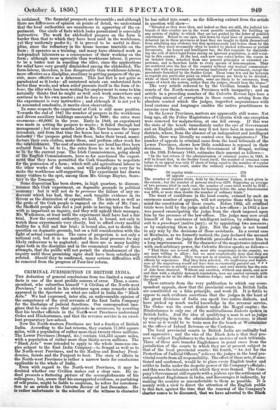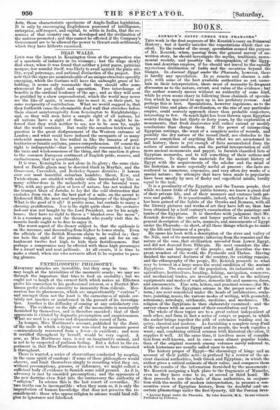CRIMINAL JURISDICTION IN BRITISH INDIA.
TICE deduction of general conclusions from too limited a range of facts is one of the most prolific sources of error. Thus, a corre- spondent, who subscribes himself "A Civilian of the North-west Provinces," is misled in his strictures upon some remarks which appeared in the Spectator on what are called in India the " Black Acts." We had expressed, inter alia, an unfavourable opinion of the competency of the civil servants of the East India Company for the discharge of judicial functions. Our correspondent ima- gines that he can prove that opinionito be erroneous, by asserting that his brother officials in the North-west Provinces understand Ordoo and Hindostannee, and that the revenue service is an excel- lent preparatory law-school. Now the North-western Provinces are but a fraction of British India. According to the last returns, they contain 71,985 square miles, with a population of rather more than twenty-three millions. The Lower Provinces (Bengal, &c.) contain 154,543 square miles, with a population of rather more than thirty-seven millions. The " Black Acts " were intended to apply to the whole immense em- pire subject to the East India Company—to Bengal as well as to . the North-west Provinces, and to the Madras and Bombay Presi- dencies, Soinde and the Punjaub to boot. The state of affairs in the North-west Provinces is rather a narrow basis for conclusions applicable to the whole of India. Even with regard to the North-west Provinces, it may be doubted whether our Civilian makes out a clear case. He in- deed presents a flattering picture of the accomplishments of his colleagues ; but, aware that his unsupported evidence, as partaking of self-praise, might be liable to suspicion, he refers for corrobora- tion to an article in the Calcutta Review of last December. He is rather unfortunate in the selection of the witness to character he has called into court; as the following extract from the article in question will show— "Situated as they were then, and indeed as they are still, thejudicial tri- bunals of this country are in the worst possible condition for building up any system of rights, to which they are not guided by the letter of positive enactments. Bound to one spot, tied down by rigid laws of procedure, and debarred (as in these provinces at least they are taught to think themselves) from admitting any evidence but that spontaneously laid before them by the parties, they must necessarily often be misled by packed witnesses or partial documents. An honest and intelligent bar, the first requisite for diminish- ing the evil of strict legal forms among an ignorant population, is still want- ing in this country. At the best, each new case comes before the courts in an isolated form, detached from any general principles or extended ex- perience, and is therefore liable to every species of misconception. They are scattered over the face of the country without any mutual communica- tion, and with no provision for securing uniformity of sentiment, except the precedents furnished by the Budder Court. These come few and far between as regards any particular point on which opinions are likely to be divided ; while of those which are applicable, some are likely to be erroneous, from causes of which the system, rather than the judges, should bear the blame." The very article referred to by the Civilian brands the local courts of the North-western Provinces with incapacity ; and an article in a preceding number of the Calcutta Review lays bare a revolting amount of corruption in those courts, arising from the absolute control which the judges, imperfect acquaintance with local customs and languages enables the native practitioners to exercise over them.
In the Lower Provinces, matters are apparently still worse. Not long ago, all the Police Magistrates of Calcutta with one exception were removed for malpractices, at one fell swoop. If this was the state of the bench immediately under the eye of Government and an English public, what may it not have been in more remote districts, where, from the absence of an independent and intelligent public, there was literally no control over the magistrates ? The number of appeals in criminal cases from the local tribunals of the Lower Provinces, shows how little confidence is reposed in their decisions. The Secretary to the Government of Bengal, writing on the 19th February 1845, estimates their amount as follows— "In the last return of the administration of criminal justice in 1843, it will be found that, in the Sadder Court itself, the number of criminal cases before it on appeal was only 47 short of being equal to the number of regular trials referred to the court, under the ordinary regulations ; the numbers being—
Of regular trials 278 Of appeals 231
The number of regular trials, held by the Sessions' Judges, is not given in the return ; but the number of persons tried was 4270. Supposing an average of two persons tried in each case, the number of cases tried would be 2135 ; while the number of appeal cases for hearing before the same functionaries was 4294, or more than double the number of ordinary trials." The want of confidence in the local courts, evinced by such an enormous number of appeals, will not surprise those who kee' in min& the constitution of those courts. Before 1832, all criminal trials Were held by the judge aided by a law-officer : in 1832 a law was passed emancipating the judge from the cheek imposed upon him by the presence of the law-officer. The judge may now avail himself of the assistance of intelligent natives, by referring the suit to a punchayet (native jury) ; or by appointing two assessors ; or by employing them as a jury. But the judge is not bound in any way by the decisions of those assistants. In a recent case at Moulmain, as we formerly noticed, the jury declared the accused not guilty, and the judge forthwith proceeded to sentence him to a long imprisonment. Of the character of the magistrates intrusted with such arbitrary power, the Calcutta Review speaks as follows- " That there are several able, most able magistrates in the country, we are most willing to allow; but we most emphatically deny that they are selected for their office. They were put in at random,. and have become good officers by experience. Had they been selected, the snefficieney and boyish- ness of the magistracy would not have been so constantly pointed out. • * • The civil service is strictly a seniority service; and very strictly has the rule of date been observed. Without any exertion, without any merit, and now and then with a slightly damaged reputation, men are carried upwards with the stream as far as the office of Sessions Judge and then they arc laid on the shelf."
These extracts from the very publication to which our corre- spondent appeals, show that the provincial courts in British India are constituted on a false principle, and work ill. It is futile to oppose to such evidence assertions that the judges in the least of the great divisions of India can speak two native dialects, and have picked up much useful knowledge in the revenue service. The Ordoo was the court dialect under the Mogul empire ; the Hindostannee is only one of the multitudinous dialects spoken in British India. And the idea of qualifying a man to act as judge by employing him in the administration of the revenue, is about as wise as it would be to train men for the bench at Westminster in the offices of Inland Revenue or the Customs.
The local provincial courts in British India are radically bad and oppressive; and the vice of. the Black Acts is that they pro- pose to subject Englishmen to the tender mercies of such tribunals. Three of these acts transfer Englishmen in penal cases from the jurisdiction of the courts to which they are at present subject to that of the local provincial courts : the fourth, "An Act for the Protection of Judicial Officers," relieves the judges in the local pro- vincial courts from all responsibility. The effect of these acts, if sanc- tioned and confirmed, would be to place every English trader and settler in India under the despotic power of the Company's officials : and this was the intention with which they were framed. The Com- pany's Government still regards with a jealous eye the settlement of independent Englishmen in India, and discourages it indirectly, by making the country as uncomfortable to them asI ssible. It is mainly with a view to direct the attention of the N. :liah public) to this fact, against the time that the renewal of the Company's charter comes to be discussed, that we have adverted to the Black
Acts, those characteristic specimens of 'Anglo-Indian legislation. It is only by encouraging Englishmen possessed of intelligence, enterprise, self-respect, and capital, to settle in India, that the re- .sources of that country can be developed and the civilization of the natives promoted ; and this cannot be effected if the Company's Government are to be allowed the power to thwart such settlement, which they have hitherto exercised.



























 Previous page
Previous page